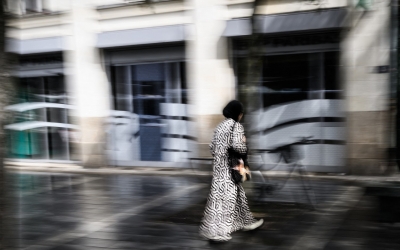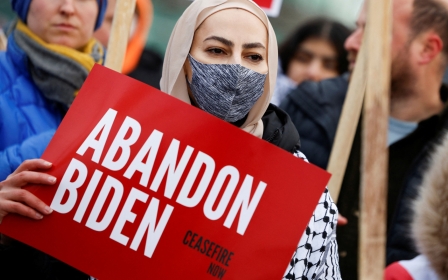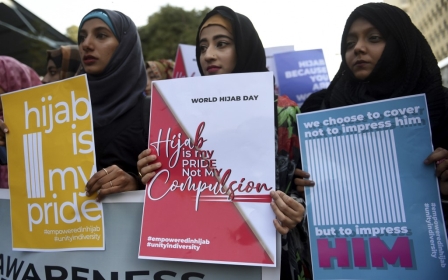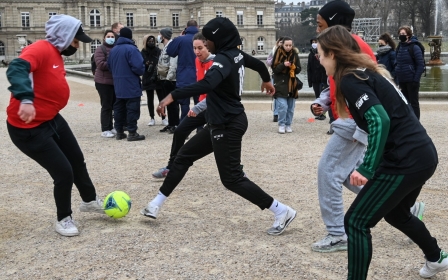How Muslim women are targeted in 'progressive' circles
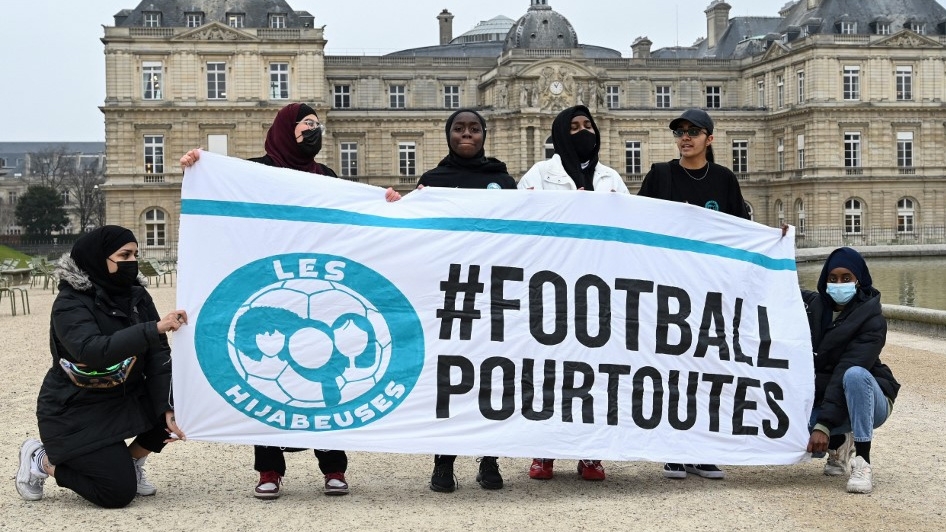
My father named me after Olympic gymnast, Nadia Comaneci, following his attendance at the 1976 Montreal Summer Games. While I didn’t follow in her athletic footsteps, I’ve carved my own path as a journalist, lawyer and law professor.
As a hijab-wearing academic observing the intersection of politics, religion and social justice, I find the current treatment of Muslim women in high-profile arenas deeply troubling.
From the hijab ban for French athletes at the Paris Olympics, to the US Democratic National Committee (DNC)’s handling of Muslim representation, we are seeing pervasive hypocrisy in “progressive” circles.
The Olympics, supposedly the pinnacle of global unity, has effectively told French Muslim women to leave their faith at the door. This is not merely a dress code issue, but a fundamental violation of religious freedoms and personal autonomy, with roots in broader French policies. In 2004, the French Senate gave final approval to a bill prohibiting the wearing of conspicuous religious symbols in public schools.
From a legal standpoint, the hijab ban at the Paris Olympics raises serious questions about discrimination and the limits of secularism in public spaces. It’s a textbook example of how seemingly neutral policies can disproportionately affect minority groups.
New MEE newsletter: Jerusalem Dispatch
Sign up to get the latest insights and analysis on Israel-Palestine, alongside Turkey Unpacked and other MEE newsletters
As both a legal scholar and an American Muslim woman, I find such developments particularly concerning, highlighting the ongoing challenges faced by religious minorities in reconciling their faith with societal expectations - even in supposedly progressive environments.
We need a deeper examination of how we balance secularism, religious freedom and inclusivity in our increasingly diverse societies.
Supporting the status quo
Visibly Muslim women also face exclusion in the political sphere. But recent movements promising radical change, such as the “Uncommitted” campaign, have quickly aligned with the establishment they once challenged. Their shift from demanding an open convention to cautiously supporting the status quo exemplifies the broader trend of progressive movements losing their edge.
Paralleling the Olympic's hypocrisy is the DNC’s treatment of Muslim delegates. While well-intentioned, the Uncommitted movement, organised by Democratic insiders, has inadvertently diluted Muslim representation. What started as a bold challenge to the political establishment has ultimately contributed to a significant reduction in Muslim delegates, from around 150 in 2020 to just around 60 in 2024, according to my own records. This is because strategic manoeuvring often sidelines minority interests in favour of broader, less specific agendas, disadvantaging groups such as Muslim delegates.
This outcome raises questions about the effectiveness of such movements and their unintended consequences. The reduction in Muslim delegate numbers is not just a statistic, it’s a dilution of collective voice and negotiating power, including on issues such as US support for Israel’s war on Gaza.
In both cases, the lofty ideals of inclusion and change have ended up marginalising Muslim voices, particularly those of women
In the world of political manoeuvring, this plays directly into the hands of pro-Israel groups, all while being labelled as progressive activism.
The Uncommitted movement, whose name now seems more ironic than ever, seems to have committed to the establishment faster than you can say “status quo”. It’s like watching a group of rebellious teenagers decide that, actually, their parents’ taste in music is not so bad after all.
On 29 June, as public calls grew for President Joe Biden to step aside, the Uncommitted movement posted on X (formerly Twitter): “We remain open to supporting an open convention if that becomes viable.” The conditional language made for a weak statement.
The push for an open convention became less like a rallying cry and more like a desperate plea: “Hey, remember all that talk about radical change? Can we at least pretend to consider it for five minutes?”
Pattern of exclusion
News outlets in the West question the death toll in Gaza, ignore the mass starvation of children and are complicit in genocide by their silence. If anyone has doubts about Vice President Kamala Harris’s position on Gaza, the presumptive Democratic presidential nominee made it abundantly clear with her recent remarks against protesters in Washington: “I condemn any individuals associating with the brutal terrorist organisation Hamas.”
I have grown so tired of this conflation between protesters and Hamas that when introducing myself to strangers, to preface any comments I make on the subject, I say: “My name is Nadia, and I am not Hamas.” Immediately, people are taken aback, apparently already presuming my support for the group.
From a legal perspective, such conflation is not only factually incorrect but also dangerously close to infringing on First Amendment rights. It creates a chilling effect on legitimate protest and dissent, the cornerstones of a functioning democracy.
The commonality between the Olympic hijab ban in France and the DNC delegate situation lies in their facade of progressivism, which masks a deeper, more insidious form of exclusion. In both cases, the lofty ideals of inclusion and change have ended up marginalising Muslim voices, particularly those of women, like myself.
This pattern of exclusion is not new. From the women’s suffrage movement, which initially excluded women of colour, to labour laws that have failed to protect women and minorities, the road to true inclusivity has been long and fraught with hypocrisy.
As we approach the November US elections, we must critically examine the gap between progressive rhetoric and action. The legal and ethical implications of excluding religious expression in public spaces, silencing dissent, and inadvertently reducing minority representation are profound.
True inclusivity requires more than lip service, demanding a commitment to upholding the rights of all individuals, even when doing so is politically inconvenient. It requires crafting policies that genuinely accommodate diversity - not just in appearance, but in substance.
The views expressed in this article belong to the author and do not necessarily reflect the editorial policy of Middle East Eye.
Middle East Eye delivers independent and unrivalled coverage and analysis of the Middle East, North Africa and beyond. To learn more about republishing this content and the associated fees, please fill out this form. More about MEE can be found here.



